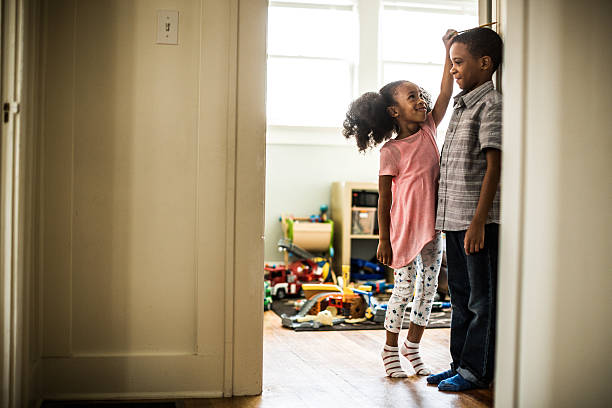
A lag in growth could be a sign that a child might suffer from undiagnosed inflammatory bowel disease (IBD), especially Crohn's disease, one pediatric doctor says.
"Growth charts are one of the most important things we look at with children because sometimes a slower growth rate is the only sign of IBD, especially with Crohn's disease," Dr. Marc Schaefer, a pediatric gastroenterologist, said in a Penn State University news release.
Symptoms of IBD in children
Other symptoms of inflammatory bowel disease in children include:
- not wanting to eat
- persistent stomach pains
- diarrhea or bloody stools
Children with these symptoms should be evaluated, he suggests.
Day 1: Just Diagnosed with Crohn’s Disease
Symptoms of Crohn's disease in children
Crohn's disease can happen at any age. Although it most often affects people ages 15 to 35, it may also occur in young children. It affects both males and females equally.
Children or teens may have Crohn's if they exhibit the following symptoms:
- Belly (abdominal) pain, often in the lower right area
- Loose stool (diarrhea), sometimes bloody
- Rectal bleeding
- Weight loss
- Fever
- Delayed growth
- Joint pain
- A cut or tear in the anus (anal fissure)
- Rashes
Some children can go years without experiencing any symptoms. This means they are in remission. There is no way to know when your
child is in remission or when their symptoms may return.
Crohn's vs. ulcerative colitis
Blood tests and endoscopy are also used to diagnose and to distinguish Crohn's from ulcerative colitis, another type of inflammatory bowel disease that causes rectal bleeding, Schaefer adds.
The causes of Crohn's and ulcerative colitis aren't clear, but it is known that family history plays a role.
"If a family history of IBD is present, there is an increased risk for a child to get it, but it's not definitive. It is difficult to predict," Dr. Tolulope Falaiye, also a pediatric IBD specialist at Penn State Hershey, said in the news release.
Even within families, symptoms and severity of the disease can vary widely. While some people manage to control the condition for a long time after the first flare-up, others have recurrences.
"We always tell families it is a lifelong condition," Schaefer says.
Another cause of IBD may be that a virus or bacteria is affecting the body's infection-fighting system (immune system). This means your child's immune system may have an abnormal inflammation reaction in the intestinal wall that doesn’t stop.
Many children that have Crohn's may have an abnormal immune system, although experts are uncertain if immune problems cause the disease or if Crohn's causes immune problems.
RELATED: What is the Difference Between Crohn’s Disease and IBS?
Triggers
Certain foods or a stomach bug can trigger symptoms in some people with inflammatory bowel disease, but
there is no special diet that cures it, according to Schaefer.
When to see a doctor
The symptoms of Crohn's disease may look like other health problems. Therefore, it is important that you see your child's healthcare provider for a diagnosis.
Your child may be checked for signs of Crohn's disease if he or she has had long-term:
- Belly (abdominal) pain
- Loose stools (diarrhea)
- Fever
- Weight loss
- A loss of healthy red blood cells (anemia). This can make your child feel tired.
Your child’s healthcare provider will take a health history and do a physical exam. The following are tests for Crohn's disease that can confirm whether or not your child has Crohn's:
- Blood tests
- Stool culture
- Endoscopy
- Colonoscopy
- Biopsy
- Upper GI series or barium swallow
- Lower GI series or barium enema
- CT enterography or MR enterography
- Capsule endoscopy
How to treat Crohn's disease in children
There is no cure for Crohn's, but these four goals will help control it:
- Correct nutritional problems
- Control the swelling and inflammation
- Ease symptoms such as belly pain, diarrhea, and rectal bleeding
- Keep complications from occurring. These include tunnels of inflammation to other organs (fistulas) and narrowing of the intestine (stricture) that causes blockages.
Your child’s healthcare provider will create a care plan based on:
- Your child's age, overall health, and medical history
- How serious your child’s case is
- How well your child handles certain medicines, treatments, or therapies
- If your child’s condition is expected to get worse
- Your opinion and what you would like to do
How to help your child
Helping your child with Crohn's disease will involve working closely with their healthcare provider. Make sure they are checking the following in your child on a regular basis:
- Growth
- Nutrition levels
- Bone mineral density
- Risk for infections
- Immunization status
- Any liver, eye, or skin problems
You should also monitor your child and make sure they are keeping up with whatever treatment method their doctor put in place, ie. diet, medicine, etc.
If your child experiences any of these symptoms whether they are new, changed or recurring, contact their doctor:
- Belly pain
- Loose stool
- Rectal bleeding
- Weight loss
- Fever
- Vomiting that continues
- Sores (lesions) or leakage at the anus








